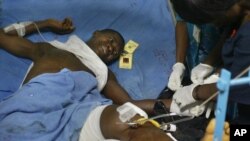The Liberian government says negotiations are underway with more than 20,000 public health workers who have been on strike since July 23. The Ministry of Health has called on the health workers to return to work while the talks take place, but striking employees say they will stay home until their demands have been met. Patients, meanwhile, say they just want to receive treatment.
Negotiations between the Ministry of Health and leaders of the National Health Workers' Association of Liberia continued Thursday in the capital, Monrovia.
It’s been more than a week since Liberian public health workers - primarily nurses - stopped showing up to work. They are staging the country’s first nationwide health care strike to protest the government’s failure to respond to their demands for better benefits and working conditions.
"The government should see a reason to pay the civil servants, to employ people," said Philip Tamba is the deputy spokesperson for the National Health Workers' Association of Liberia. "We should respect labor laws in this country. We don’t just work because we feel like working. There are so many qualified Liberians that are qualified to provide health services for the Liberian people, for the masses. But as I am speaking to you, now those people are sitting down although they told us to go back to work.”
Three basic demands
Tamba said the nurses have three main demands.
He said the first is an increase in salary. Registered nurses in Liberia currently take home around $150 per month. They are now asking for their salary to be increased to at least $200 per month.
The second demand is the timely payment of wages. Tamba said many of the nurses report going two or three months without receiving their paychecks.
Tamba said the third demand is that the government give full-time employment status to longtime contracted workers, who do the same work as their employed colleagues, but receive no benefits.
Need for 'give-and-take'
Minister of Health Walter Gwenigale said he understands the concerns of the nurses, but said they must be willing to compromise because the Ministry’s budget isn’t big enough to meet all their demands.
"I want to confirm that I’m willing to continue to talk to the health workers on behalf of the health of our people; that it is important that the differences that we have be discussed and resolved," he said. "But there is one thing called negotiation where you have give-and-take, and there is something called a demand that must be met, irrespective of what happens. Clearly some of these things that the people were talking about, some are at our level, others are not at our level."
As negotiations continue, Gwenigale and President Ellen Johnson Sirleaf have both urged the striking nurses to return to work for the sake of Liberia’s health.
Public hospitals and clinics throughout the country remain closed or are seriously understaffed.
Residents are increasingly complaining of not being able to find health care for themselves and loved ones.
Since the strike began, at least eight people are reported to have died after not receiving medical treatment.
Negotiations between the Ministry of Health and leaders of the National Health Workers' Association of Liberia continued Thursday in the capital, Monrovia.
It’s been more than a week since Liberian public health workers - primarily nurses - stopped showing up to work. They are staging the country’s first nationwide health care strike to protest the government’s failure to respond to their demands for better benefits and working conditions.
"The government should see a reason to pay the civil servants, to employ people," said Philip Tamba is the deputy spokesperson for the National Health Workers' Association of Liberia. "We should respect labor laws in this country. We don’t just work because we feel like working. There are so many qualified Liberians that are qualified to provide health services for the Liberian people, for the masses. But as I am speaking to you, now those people are sitting down although they told us to go back to work.”
Three basic demands
Tamba said the nurses have three main demands.
He said the first is an increase in salary. Registered nurses in Liberia currently take home around $150 per month. They are now asking for their salary to be increased to at least $200 per month.
The second demand is the timely payment of wages. Tamba said many of the nurses report going two or three months without receiving their paychecks.
Tamba said the third demand is that the government give full-time employment status to longtime contracted workers, who do the same work as their employed colleagues, but receive no benefits.
Need for 'give-and-take'
Minister of Health Walter Gwenigale said he understands the concerns of the nurses, but said they must be willing to compromise because the Ministry’s budget isn’t big enough to meet all their demands.
"I want to confirm that I’m willing to continue to talk to the health workers on behalf of the health of our people; that it is important that the differences that we have be discussed and resolved," he said. "But there is one thing called negotiation where you have give-and-take, and there is something called a demand that must be met, irrespective of what happens. Clearly some of these things that the people were talking about, some are at our level, others are not at our level."
As negotiations continue, Gwenigale and President Ellen Johnson Sirleaf have both urged the striking nurses to return to work for the sake of Liberia’s health.
Public hospitals and clinics throughout the country remain closed or are seriously understaffed.
Residents are increasingly complaining of not being able to find health care for themselves and loved ones.
Since the strike began, at least eight people are reported to have died after not receiving medical treatment.








